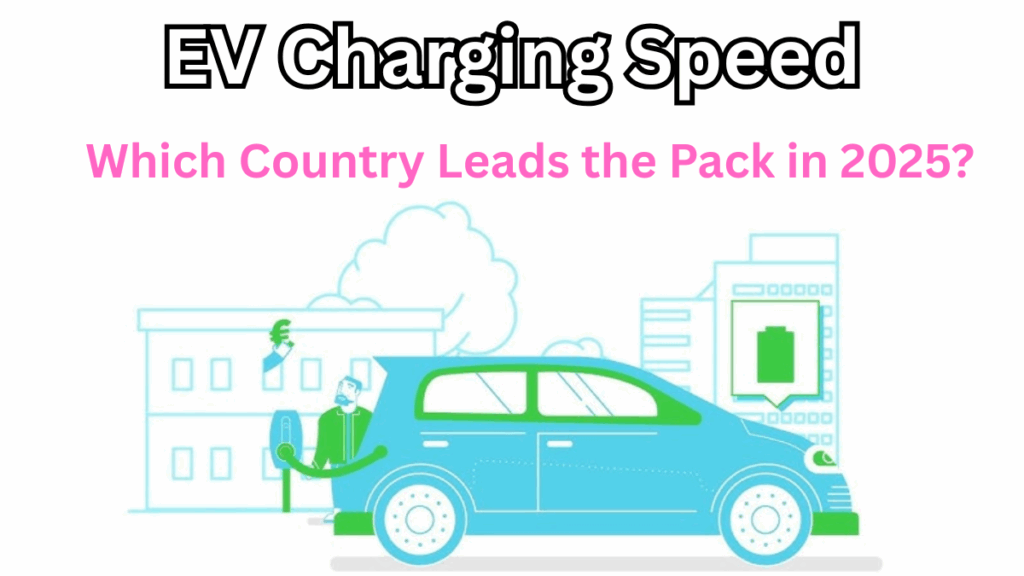As electric vehicles (EVs) become more popular worldwide, one question remains crucial for drivers and industry experts alike: Which country offers the fastest EV charging speeds? In 2025, the EV charging speed rankings by country reveal a competitive landscape where technology, infrastructure, and government policies shape the future of electric mobility.
Whether you’re an EV owner, a potential buyer, or just curious about the global shift, understanding which countries dominate in fast charging can help you plan trips, investments, and innovations. Let’s dive into the latest EV comparison of charging speeds and discover who leads the charge in the global list.

What Determines EV Charging Speed?
Before we reveal the leaders, it’s important to understand what impacts charging speed:
-
Charger type (Level 2 vs. Level 3/DC fast chargers)
-
Network infrastructure (availability and power output)
-
Vehicle battery compatibility
-
Government incentives and investments
-
Technology advancements in battery and charging
With these factors in mind, countries that have invested heavily in fast-charging networks and technology naturally rank higher in EV charging speed.
Top Countries in EV Charging Speed Rankings by Country (2025)
Here’s a snapshot of the leading countries known for their fast EV charging capabilities, compiled from recent global studies and infrastructure reports:
| Country | Average Fast Charging Speed (kW) | Key Strengths | Notable EV Networks |
|---|---|---|---|
| China | 250+ | Extensive rapid charger deployment | Tesla Superchargers, CATL |
| Norway | 150-200 | High EV adoption, government subsidies | Fortum, Circle K, Ionity |
| Germany | 150-180 | Strong investment in public and highway chargers | EnBW, Ionity, Tesla Superchargers |
| South Korea | 120-150 | Advanced battery tech, expanding network | KOGAS, EV Infra |
| United States | 100-160 | Growing fast charger infrastructure | Electrify America, Tesla |
These countries not only offer fast charging but have also built networks that support seamless, convenient EV use — essential for wider adoption.
Why Does Fast Charging Matter?
The push for fast charging goes beyond convenience; it’s about making EVs a practical alternative to gasoline cars. Here’s why it matters:
-
Reduces range anxiety: Quick top-ups mean less worry about running out of battery.
-
Supports long-distance travel: Fast chargers on highways enable road trips.
-
Increases EV adoption: Easier charging attracts more buyers.
-
Boosts renewable energy integration: Smart charging can balance grid loads better.
In short, faster charging makes electric driving smoother, more accessible, and future-ready.
Global EV Charging Speed Rankings by Country: Key Takeaways
-
China leads the global list thanks to massive investments in ultra-fast chargers.
-
Europe’s front runners (Norway, Germany) combine high speeds with dense networks.
-
Emerging leaders like South Korea are catching up fast with innovation.
-
The US continues rapid growth with expanding charger availability, though speeds vary.
The race to dominate EV charging is also a race to lead the green transportation revolution.
FAQs
Q1: What’s the difference between fast charging and regular charging?
Fast charging typically uses DC power and can charge an EV to 80% in 20-40 minutes, whereas regular AC chargers take several hours.
Q2: How do these charging speeds impact daily EV use?
Faster charging means less downtime, making EVs more convenient for commuting, errands, and trips.
Q3: Are there safety concerns with fast charging?
Modern fast chargers and EVs are designed with multiple safety features to manage heat and electrical load effectively.
Q4: Will all EVs be able to use ultra-fast chargers soon?
Compatibility depends on vehicle battery technology, but most new EVs support fast charging standards increasingly adopted worldwide.
Click here to learn more
